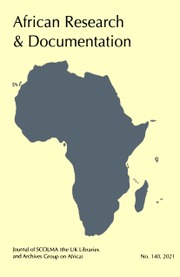No CrossRef data available.
Article contents
Digital Archives in a Changing Rwanda
Published online by Cambridge University Press: 25 April 2022
Extract
Digital archives in Rwanda are at the heart of national and international projects. This article traces two areas - education and research - in which the Genocide Archive of Rwanda is being used for awareness-raising, skills development, and interdisciplinary research. We discuss ‘Education for Sustainable Peace in Rwanda’, a three year programme initiated by the Aegis Trust, and ‘Rwandan Stories of Change’, a collaborative research project based at the University of St Andrews. These illustrate the value and potential of using an archive, and demonstrate how that archive is being developed as Rwanda as a nation continues to shift and change. We highlight the scope for impactful collaboration and the central importance of storytelling and testimony.
- Type
- Research Article
- Information
- Copyright
- Copyright © International African Institute 2017




